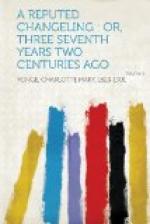“I think so. I saw a poor boy, who seemed to me to have had a stroke of some sort when he was an infant.”
“But, madam, that would not make him so spiteful and malicious!”
“If every one is against him and treats him as a wicked mischievous elf, it is only too likely to make him bitter and spiteful. Nay, Anne, if you come back stuffed with old wives’ tales, I shall not allow you to go home with Lucy Archfield.”
The threat silenced Anne, who was a grave and rather silent little person, and when she mentioned it to her friend, the answer was, “Did you tell your mother? If I had told mine, I should have been whipped for repeating lying tales.”
“Oh then you don’t believe it!”
“It must be true, for Madge knew it. But that’s the way always if one lets out that one knows more than they think.”
“It is not the way with my mother,” stoutly said Anne, drawing up her dignified little head. And she kept her resolution, for though a little excited by her first taste of lively youthful companionship, she was naturally a thoughtful reticent child, with a character advanced by companionship with her mother as an only child, through a great sorrow. Thus she was in every respect more developed than her contemporary Lucy, who regarded her with wonder as well as affection, and she was the object of the boyish devotion of Charley, who often defended her from his cousin Sedley’s endeavours to put down what he considered upstart airs in a little nobody from London. Sedley teased and baited every weak thing in his way, and Lucy had been his chief butt till Anne Woodford’s unconscious dignity and more cultivated manners excited his utmost spleen.
Lucy might be incredulous, but she was eager to tell that when her cousin Sedley Archfield was going back to ‘chambers,’ down from the Close gate came the imp on his shoulders in the twilight and twisted both legs round his neck, holding tight on in spite of plunges, pinches, and endeavours to scrape him off against the wall, which were frustrated or retaliated by hair pulling, choking, till just ere entering the college gateway, where Sedley looked to get his revenge among his fellows, he found his shoulders free, and heard “Ho! ho! ho!” from the top of a wall close at hand. All the more was the young people’s faith in the changeling story confirmed, and child-world was in those days even more impenetrable to their elders than at present.
Changeling or no, it was certain that Peregrine Oakshott was the plague of the Close, where his father, an ex-officer of the Parliamentary army, had unwillingly hired a house for the winter, for the sake of medical treatment for his wife, a sufferer from a complication of ailments. Oakwood, his home, was about five miles from Dr. Woodford’s living of Portchester, and as the families would thus be country neighbours, Mrs. Woodford thought it well to begin the acquaintance at Winchester. While knocking at the door of the house on the opposite side of the Close, she was aware of an elfish visage peering from an upper window. There was the queer mop of dark hair, the squinting light eyes, the contorted grin crooking the mouth, the odd sallow face, making her quite glad to get out of sight of the strange grimaces which grew every moment more hideous.




